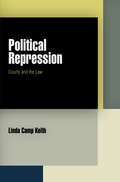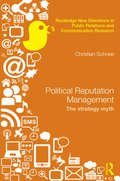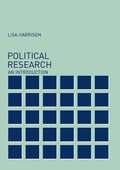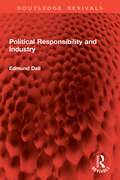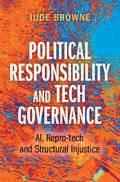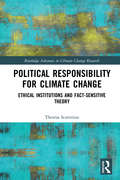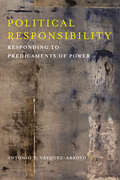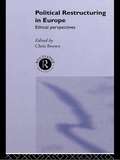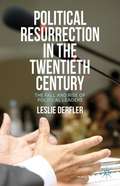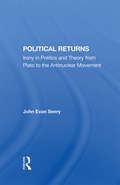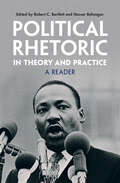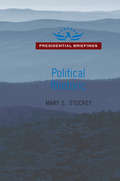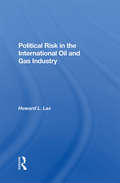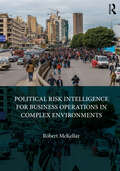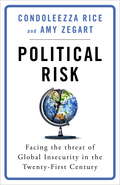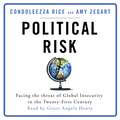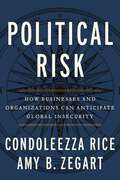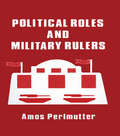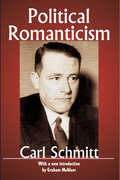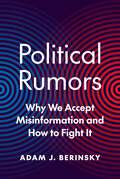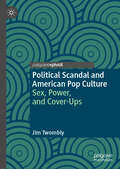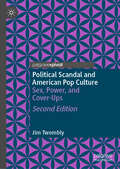- Table View
- List View
Political Repression: Courts and the Law (Pennsylvania Studies in Human Rights)
by Linda Camp KeithThe world seems to have reached agreement on a set of ideals regarding state human rights behavior and the appropriate institutions to promote and protect those ideals. The global script for state legitimacy calls for a written constitution or the equivalent with an embedded bill of rights, democratic processes and institutions, and increasingly, a judicial check on state power to protect human rights. While the progress toward universal formal adherence to this global model is remarkable, Linda Camp Keith argues that the substantive meaning of this progress is much less clear. In Political Repression, she seeks to answer two key questions: Why do states make formal commitments to democratic processes and human rights? What effect do these commitments have on actual state behavior, especially political repression?The book begins with a thorough exploration of a variety of tools of state repression and presents evidence for substantial formal acceptance of international human rights norms in constitutional documents as well as judicial independence. Keith finds that these institutions reflect the diffusion of global norms and standards, the role of transnational networks of nongovernmental organizations, and an electoral logic in which regimes seek to protect their future interests. Economic liberalism, on the other hand, decreases the likelihood that states adopt or maintain these provisions. She demonstrates that the level of judicial independence is influenced by constitutional structures and that levels of judicial independence subsequently achieved in turn diminish the probability of state repression of a variety of rights. She also finds strong evidence that rights provisions may indeed serve as a constraint on state repression, even when controlling for many other factors.
Political Reputation Management: The Strategy Myth (Routledge New Directions in PR & Communication Research)
by Christian SchneeIt is widely assumed that a competitive political environment of public distrust and critical media forces political parties to manage communications and reputations strategically, but is this really true? Comprehensive control of communications in a fast-moving political and media setting isoften upset by events outside the communicator’s control, taking over the news agenda andchanging the political narrative. Based on interviews with leading communicators and journalists, this book explores the tensions between a planned, strategic communications approach and a reactive, tactical one. The interviewees, who over the past 15 years have been instrumental in presenting and shaping the public persona of party leaders and Prime Ministers, include, amongst others, William Hague, Ian Duncan-Smith, Michael Howard, David Cameron, Tony Blair and Gordon Brown.It draws a unique picture of how political reputations are managed and, ultimately, confirms the discrepancy between what political communications management is thought to be, and how communications practitioners actually operate. This book empirically reviews political communications practice in order to analyse to what degree reality matches the concepts of strategic communications management. This will be essential reading for researchers, educators and advanced students in public relations, communications studies and marketing.
Political Research: An Introduction
by Lisa Harrison Nicholas StartinPolitical Research: An Introduction has been designed to provide an excellent starting point for those new to the area of Research Methods. It assumes no prior knowledge of the subject and sets out the key issues involved in doing research in Politics. It guides students through a complex and often daunting subject by exploring the many concepts associated with the field, as well as offering practical advice on research practices and information resources. Features and benefits of this textbook include:* boxed case studies in each chapter to illustrate and clarify key concepts, and highlight the practical use of different research methods* a useful glossary, giving easy access to definitions of key terms* a dedicated web-site containing sample material, extra case studies, important links, and essential resources for both teachers and students.
Political Responsibility Refocused
by Loralea Michaelis Genevieve JohnsonIn our highly globalized and networked society, even our most seemingly local actions can have far-reaching social, political, economic, and environmental consequences. Has this changed our moral and political obligations towards people distant from us in space and time - for instance, to generations who are not yet or no longer living, or towards those beyond the borders of our own nations?Political Responsibility Refocused explores the theoretical foundations and practical implications of individual and collective responsibility towards those who are spatially or temporally separate from us. These essays offer critical assessments of our political responsibilities on topics such as residential schools, sweatshop labour, climate change, and forms of energy generation. Inspired by the final published writings of political and social theorist Iris Marion Young, specifically her outline of a "social connection model" of political responsibility, the contributors assess whether there are practices, policies, and institutions that could meaningfully address these expanded political responsibilities.
Political Responsibility and Industry (Routledge Revivals)
by Edmund DellFirst published in 1973, Political Responsibility and Industry discusses the nature of industrial policy and the capacity of the British governmental system to conduct it. This theme is illustrated by particular examples of the working of government-industry relations with which the author was intimately connected, such as the aluminium smelter project and the textile industry enquiry; and by discussion of particular instruments of industrial policy such as the Industrial Reorganisation Corporation and the Geddes Report on shipbuilding.The author is critical of the tendency to regard industrial policy as some new catalyst of industrial growth. He describes it, at its best, as simply ‘casework in the public interest’. In a penetrating analysis of the machinery of government in Britain, he shows that this is inadequate as an instrument for the effective control of industrial policy. This in turn leads on to a discussion of the ‘myth of ministerial responsibility’ which, the author suggests, rather than locating effective responsibility for policy, ensures that it is not located anywhere at all. The arguments presented should be of interest not only to those concerned with Government-industry relations, but to anyone worried about the working of Parliamentary government in Britain.
Political Responsibility and Tech Governance: AI, Repro-tech and Structural Injustice
by Jude BrowneNot a day goes by without a new story on the perils of technology: from increasingly clever machines that surpass human capability and comprehension to genetic technologies capable of altering the human genome in ways we cannot predict. How can we respond? What should we do politically? Focusing on the rise of robotics and artificial intelligence (AI), and the impact of new reproductive and genetic technologies (Repro-tech), Jude Browne questions who has political responsibility for the structural impacts of these technologies and how we might go about preparing for the far-reaching societal changes they may bring. This thought-provoking book tackles some of the most pressing issues of our time and offers a compelling vision for how we can respond to these challenges in a way that is both politically feasible and socially responsible.
Political Responsibility for Climate Change: Ethical Institutions and Fact-Sensitive Theory (Routledge Advances in Climate Change Research)
by Theresa Birgitta ScaveniusThis book offers new perspectives on how social and political institutions can respond more effectively to climate change. Theresa Scavenius presents a concept of moral responsibility that does not address the obligations of individual citizens, but instead assesses the moral responsibility of institutionalised actors, such as governments, parliaments, and other governmental agencies. This focus on political responsibility is something that up until now has largely been neglected by moral theory, but Scavenius argues in this book that accountability must be assigned to institutionalised group agents. With this new research, she outlines building blocks for a new agenda of climate studies by offering an innovative approach to climate governance and democratic climate action at a time when many political initiatives have failed and crucially outlines the necessity of approaching moral dilemmas from a fact sensitive political theoretical approach. Written in a clear and engaging style, this volume will be an invaluable reference for researchers interested in moral philosophy, climate change, environmental politics and policy, and institutional theory.
Political Responsibility: Responding to Predicaments of Power (New Directions in Critical Theory #25)
by Antonio Vázquez-ArroyoScholars in the humanities and social sciences have turned to ethics to theorize politics in what seems to be an increasingly depoliticized age. Yet the move toward ethics has obscured the ongoing value of political responsibility and the vibrant life it represents as an effective response to power. Sounding the alarm for those who care about robust forms of civic engagement, this book fights for a new conception of political responsibility that meets the challenges of today's democratic practice. Antonio Y. Vázquez-Arroyo forcefully argues against the notion that modern predicaments of power can only be addressed ethically or philosophically through pristine concepts that operate outside of the political realm. By returning to the political, the individual is reintroduced to the binding principles of participatory democracy and the burdens of acting and thinking as a member of a collective. Vázquez-Arroyo historicizes the ethical turn to better understand its ascendence and reworks Adorno's dialectic of responsibility to reassert the political in contemporary thought and theory.
Political Restructuring in Europe: Ethical Perspectives
by Chris BrownA distinguished selection of contributors provide the theoretical background to the restructuring of Europe that is currently underway. It attempts to situate the ethical debates in a historical, legal and constitutional context, considering important and topical issues such as the rights to seccession and self-determination of minorities in Eastern Europe, and the question of whether national movements are justified in using force to achieve their ends.The authors number legal and constitutional scholars, political philosophers and international relations theorists. There are contributions from Poland and Croatia.
Political Resurrection in the Twentieth Century
by Leslie DerflerCharles de Gaulle of France, Juan Per#65533;n of Argentina, and Pierre Elliott Trudeau of Canada all achieved the pinnacle of political power, fell from or relinquished power, and then, after a period in the political wilderness, regained their power. By placing greater emphasis than that customarily accorded by biographers on the interment that followed their fall and preceded their resurrection, Derfler describes what they did, the lessons they learned, and the mistakes made by their successors that facilitated their reentry.
Political Returns: Irony In Politics And Theory From Plato To The Antinuclear Movement
by John Evan SeeryThis book presents a theory of the politics of irony and tests this theory through readings of political theory texts and through an analysis of the politics of the contemporary anti-nuclear movement, and argues that political writing must be ironic.
Political Rhetoric in the Oxford and Cambridge Unions, 1830–1870
by Taru HaapalaThis book offers much-needed insight into the Oxford and Cambridge Unions and the important role they have played in nineteenth-century British political culture. Despite this role, or perhaps for that very reason, the Unions have received very little scholarly attention as to their political activities. This study will focus particularly on debating practices through which their members became knowledgeable of the parliamentary way of doing politics. More significantly, it uses the original Union records as primary research material to show that they also had unique political practices of their own. Presenting a detailed analysis of their debates, the book argues that the Unions should be appreciated as independent political arenas, not mere extensions of Westminster politics.
Political Rhetoric: A Presidential Briefing Book (Presidential Briefings Ser.)
by Mary E. StuckeyRhetoric is among the most important and least understood elements of presidential leadership. Presidents have always wielded rhetoric as one tool of governance—and that rhetoric was always intended to facilitate political ends, such as image building, persuasion of the mass public, and inter-branch government persuasion. But as mass media has grown and then fragmented, as the federal bureaucracy has continued to both expand and calcify, and as partisanship has heightened tensions both within Congress and between Congress and the Executive, rhetoric is an increasingly important element of presidential governance.Scholars have derived ways to explain how these developments and the presidents' use of rhetoric have contributed to and detracted from the health of American democracy. This briefing book offers a succinct reflection on the ways in which historical developments have encouraged the use of political rhetoric. It explores strategies of "going public" to provide some leverage over the political system and the lessons one might derive from these choices.This essential analysis, written for lay readers, scholars, students, and future presidents, is the first in Transaction's innovative Presidential Briefings series. Mary E. Stuckey covers the scholarly literature with authority and offers examples of rhetoric that have lasting influence.
Political Risk In The International Oil And Gas Industry
by Calvin Goldscheider Howard L LaxIn this book, the author draws upon his training in political science and experience as an energy consultant at Atlantis, Inc. It explores the conflicting interests of host and firm, and discusses the way firms use political risk analyses leads us to the issue of managing political risk.
Political Risk Intelligence for Business Operations in Complex Environments
by Robert MckellarMacro-level dynamics and modelling are well represented in the mainstream political risk literature. However, not many writings on the subject get their hands dirty in terms of revealing the hard, nuanced and practical work behind knowing what the issues might be for a specific foreign operation in a sensitive or volatile context, and how to plan for them. Political Risk Intelligence for Business Operations in Complex Environments provides international managers, and by extension their organisations, with a foundational understanding of political risk analysis and planning for on-the-ground operations in challenging times and places. This means having a fluid grasp of what political risk means and why it matters in the organisation’s context, and how relevant intelligence can be gathered and analysed to inform decisions and planning towards an operation’s socio-political resilience. The book explains: How and why political risk manifests and the forms it can take Company attitudes and operational attributes as a political risk variable Understanding the operational implications of socio-political dynamics and trends Stakeholder identification and analysis for informed engagement planning Scenario analysis to prepare for long-term contingencies and discontinuities Holistic, intelligence-driven political risk management planning Tactical intelligence exercises to maintain awareness and inform adaptation Intelligence management, collection and quality control Ethical considerations in political risk management Rather than being bound by conventional notions of risk, the book emphasises the dynamic relationship between a foreign operation and its host environment and milieu as a source of both challenges and opportunities to manage them. Concepts, frameworks and practices are rounded out with real-world examples and relevant lessons from the author’s experience as a political risk consultant.
Political Risk: Facing the Threat of Global Insecurity in the Twenty-First Century
by Condoleezza Rice Amy ZegartPolitical risk - the probability that a political action could significantly affect an organisation - is changing fast, and it's more widespread than ever before.In the past, the chief concern used to be whether a foreign dictator would nationalise the country's oil industry. Today, political risk stems from a widening array of agents, from Twitter users and terrorists to hackers and insurgents. What's more, the very institutions and laws that are supposed to reduce uncertainty and risk often increase it instead. This means that in today's globalised world there are no 'safe' bets. Political risk affects companies and organisations of all sizes, operating everywhere from London to Lahore, even if they don't know it.Political Risk investigates and analyses this shifting landscape, suggests what businesses can do to navigate it, and explains how all of us can better understand these rapidly changing geopolitical dynamics.
Political Risk: Facing the Threat of Global Insecurity in the Twenty-First Century
by Condoleezza Rice Amy ZegartPolitical risk - the probability that a political action could significantly affect an organisation - is changing fast, and it's more widespread than ever before.In the past, the chief concern used to be whether a foreign dictator would nationalise the country's oil industry or impose onerous new regulations. Today, political risk stems from a widening array of political agents, from Twitter users and terrorists to local officials, transnational activists, hackers and insurgents. What's more, the very institutions and laws that are supposed to reduce uncertainty and risk often increase it instead. This means that in today's globalised world there are no 'safe' bets. Political risk affects companies and organisations of all sizes, operating everywhere from London to Lahore, even if they don't know it.Political Risk investigates and analyses this shifting landscape, suggests what businesses can do to navigate it, and explains how all of us can better understand and deal with these rapidly changing geopolitical dynamics.Read by Grace Angela Henry(P) Hachette book Group US 2018
Political Risk: How Businesses and Organizations Can Anticipate Global Insecurity
by Condoleezza Rice Amy B. ZegartFrom New York Times bestselling author and former U.S. secretary of state Condoleezza Rice and Stanford University professor Amy B. Zegart comes an examination of the rapidly evolving state of political risk, and how to navigate it.The world is changing fast. Political risk-the probability that a political action could significantly impact a company's business-is affecting more businesses in more ways than ever before. A generation ago, political risk mostly involved a handful of industries dealing with governments in a few frontier markets. Today, political risk stems from a widening array of actors, including Twitter users, local officials, activists, terrorists, hackers, and more. The very institutions and laws that were supposed to reduce business uncertainty and risk are often having the opposite effect. In today's globalized world, there are no "safe" bets.POLITICAL RISK investigates and analyzes this evolving landscape, what businesses can do to navigate it, and what all of us can learn about how to better understand and grapple with these rapidly changing global political dynamics. Drawing on lessons from the successes and failures of companies across multiple industries as well as examples from aircraft carrier operations, NASA missions, and other unusual places, POLITICAL RISK offers a first-of-its-kind framework that can be deployed in any organization, from startups to Fortune 500 companies.Organizations that take a serious, systematic approach to political risk management are likely to be surprised less often and recover better. Companies that don't get these basics right are more likely to get blindsided.
Political Roles and Military Rulers
by Amos PerlmutterThis book represents three decades of Perlmutter's experiences and observations. The author studies the relationship between the military and politics in Middle East, focusing mainly on Egypt as a case study. He concludes by analysing the effect this internal relationship has on military performance.
Political Romanticism (Studies In Contemporary German Social Thought Ser.)
by Carl SchmittA pioneer in legal and political theory, Schmitt traces the prehistory of political romanticism by examining its relationship to revolutionary and reactionary tendencies in modern European history. Both the partisans of the French Revolution and its most embittered enemies were numbered among the romantics. During the movement for German national unity at the beginning of the nineteenth century, both revolutionaries and reactionaries counted themselves as romantics. According to Schmitt, the use of the concept to designate opposed political positions results from the character of political romanticism: its unpredictable quality and lack of commitment to any substantive political position.The romantic person acts in such a way that his imagination can be affected. He acts insofar as he is moved. Thus an action is not a performance or something one does, but rather an affect or a mood, something one feels. The product of an action is not a result that can be evaluated according to moral standards, but rather an emotional experience that can be judged only in aesthetic and emotive terms.These observations lead Schmitt to a profound reflection on the shortcomings of liberal politics. Apart from the liberal rule of law and its institution of an autonomous private sphere, the romantic inner sanctum of purely personal experience could not exist. Without the security of the private realm, the romantic imagination would be subject to unpredictable incursions. Only in a bourgeois world can the individual become both absolutely sovereign and thoroughly privatized: a master builder in the cathedral of his personality. An adequate political order cannot be maintained on such a tolerant individualism, concludes Schmitt.
Political Rumors: Why We Accept Misinformation and How to Fight It (Princeton Studies in Political Behavior #18)
by Adam J. BerinskyWhy debunked political rumors persist and how to combat themPolitical rumors and misinformation pollute the political landscape. This is not a recent phenomenon; before the currently rampant and unfounded rumors about a stolen election and vote-rigging, there were other rumors that continued to spread even after they were thoroughly debunked, including doubts about 9/11 (an “inside job”) and the furor over President Obama’s birthplace and birth certificate. If misinformation crowds out the truth, how can Americans communicate with one another about important issues? In this book, Adam Berinsky examines why political rumors exist and persist despite their unsubstantiated and refuted claims, who is most likely to believe them, and how to combat them.Drawing on original survey and experimental data, Berinsky shows that a tendency toward conspiratorial thinking and vehement partisan attachment fuel belief in rumors. Yet the reach of rumors is wide, and Berinsky argues that in fighting misinformation, it is as important to target the undecided and the uncertain as it is the true believers. We’re all vulnerable to misinformation, and public skepticism about the veracity of political facts is damaging to democracy. Moreover, in a world where most people simply don’t pay attention to politics, political leaders are often guilty of disseminating false information—and failing to correct it when it is proven wrong. Berinsky suggests that we should focus on the messenger as much as the message of rumors. Just as important as how misinformation is debunked is who does the debunking.
Political Scandal and American Pop Culture: Sex, Power, and Cover-Ups
by Jim TwomblyThis book provides a newer definition of political scandal and applies it in a way to remove “ordinary corruption” from the discussion. It then defines pop culture and examines how scandal and pop culture interact. The discussion addresses the question: when does a scandal actually enter into our pop culture. The mechanisms or vehicles by which this occurs include editorial cartoons, Broadway shows, music, movies, television, and more. The first chapter lays out the two main definitions and gives a bit of historical background to the discussion that follows. Chapters 2 through 8 deal with scandals from Watergate to the Trump Administration and from presidents to members of Congress and governors. Chapter 9 ties all of the previous discussion together and makes an assessment of the contemporary state of scandal and pop culture.This book works well as a supplement in a course on American Government, in American Studies, and is aimed at a wide range of readers from college freshmen to more advanced scholars and political junkies.
Political Scandal and American Pop Culture: Sex, Power, and Cover-Ups
by Jim TwomblyThis book provides a newer definition of political scandal and applies it in a way to remove “ordinary corruption” from the discussion. It then defines pop culture and examines how scandal and pop culture interact. The discussion addresses the question: when does a scandal actually enter into our pop culture. The mechanisms or vehicles by which this occurs include editorial cartoons, Broadway shows, music, movies, television, and more. The first chapter lays out the two main definitions and gives a bit of historical background to the discussion that follows. This new edition builds on the previous book with analysis of January 6th, George Santos, allegations of election fraud, and Rudy Giuliani. This book works well as a supplement in a course on American Government, in American Studies, and is aimed at a wide range of readers from college freshmen to more advanced scholars and political junkies.
Political Science (English Medium) class 8 - Karnataka Board
by Karnataka Textbook SocietyThe 8th Standard English Medium Political Science textbook for Specially Abled Students in Karnataka provides a simplified and engaging approach to the subject. Comprising 10 chapters, it introduces students to foundational concepts of political science, including the state, government, citizenship, and fundamental rights. The book emphasizes active learning through discussions, debates, and group activities, fostering critical thinking and self-learning. Each chapter is designed with clear learning objectives and exercises, enabling students to grasp essential political ideas and their relevance in contemporary society. The textbook also connects political science with other social sciences, highlighting its significance in shaping responsible and informed citizens.
